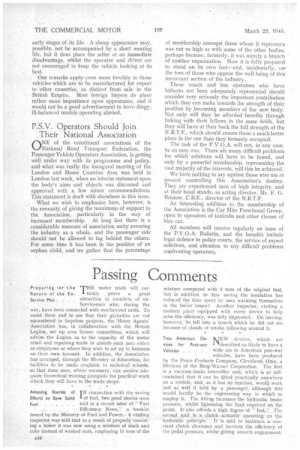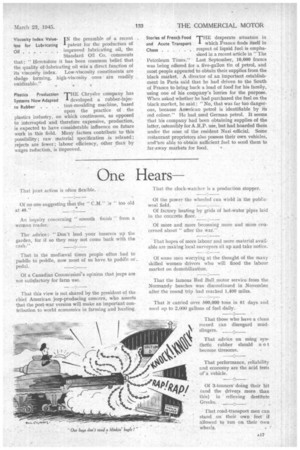Passing Comments THE motor trade will cer
Page 18

Page 19

If you've noticed an error in this article please click here to report it so we can fix it.
tainly prove a great attraction to numbers of exServicemen who, during the war, have been connected with mechanized units. To assist them and to see that their gratuities are not squandered in hopeless projects, the Motor Agents' Association has, in collaboration with the British Legion, set up area liaison committees, which will advise the Legion as to the capacity of the motor retail and repairing trade to absorb such men either as employees or where they wish to set up in business on. their own account. In addition, the Association has arranged, through the Ministry of Education, for lacIlities to be made available in technical schools, so that these men, where necessary, can receive adequate theoretical training alongside the practical work which they will have in the trade shops. Preparing for the Return of the ExService Man . .
Amusing Stories of IN connection with the saving Efforts to Save Solid of fuel, two good stories were Fuel told in a recent issue of " Fuel
Efficiency News," a booklet issued, by the Ministry of Fuel and Power.-A visiting inspector was told that as a result of properly man at ing a boiler it was now using a mixture of slack and coke instead of washed nuts, employing LI tons of the
mixture compared with' 2 tons of the original fuel, but hi addition to this saving the insulation has reduced the time spent by men warming themselves in the boiler house!. Another inspector, visiting a modern plant equipped with every device to help raise the efficiency, was duly impressed. On leaving, however, lie fell into a trench which he did not see because of clouds of smoke billowing around it.
Two American DeNEW devices, which are vices for Post-war described as likely to have a Vehicles wide use in American post-war . vehicles, have been produced by the Pesco Products Company, Cleveland, Ohio, a Division of the Borg-Warner Corporation. The first is a vacuum-brake intensifier unit, which is so selfcontained that it can be attedpractically anywhere on a vehicle,and, as it has no reaction, would -work just as well if held by a passenger, although this would hardly be the engineering way in which to employ it. The fitting increases the hydraulic brake.' pressure, whilst lightening the load required on the
pedal. It also affords a high degree of feel. The
second_Anit is clutch. actuatar operating-on the
hydraulic principle. it is said to maintain a constant clutch clearance and increase the efficiency of the pedal presSure, whilst giving smooth engagement. I N the preamble of a recent patent for the production of improved lubricating oil, the Standard Oil Co. comments that: ' Heretofore it has been common belief that the quality oflubricating oil was a direct function of its viscosity index. Low-viscosity constituents are sludge forming, high-viscosity ones are readily oxidizable." Viscosity Index ValueI,ess for Lubricating Oil
Plastics Production r-r9HE Chrysler company has
Systems Now Adapted I developed a rubber-injec to Rubber . . , tion-moulding machine, based upon the practice of the plastics industry, on which continuous, as opposed to interrupted and therefore expensive, production, is expected to have considerable influence on future work in this field. Many factors contribute to' this possibility; raw material specification is relaxed; rejects are fewer ; labour efficiency, other than by ages reduction, is improved. Stories of French Food THE desperate situation in and Acute TransportL which France finds itself in Chaos respect of liquid fuel is empha sized in a recent article in "The Petroleum Times." Last September, 10,000 francs was being offered for a five-gallon tin of petrol, and most people appeared to obtain their supplies from the black market. A director of an important establishment in Paris said that he had driven to the South of France to bring back a load of food for his family, using one of his company's lorries for the purpose. When asked whether he had purchased the fuel on the black market, he said : "No. that was far too dangerous, because American petrol is identifiable by its red colour." He had used German petrol. It seems that his company had been obtaining supplies of the latter, ostensibly for A.R.P. use, but had hoarded them under the nose of the resident Nazi 4fiIcial. Some restaurant proprietors also possess their own vehicles, and"are able to obtain sufficient fuel to send them to far-away markets for food. •




















































